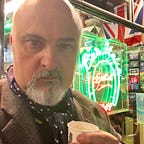Song for my father
Forgive the indulgence, but it is twenty years to the day since my father Gordon Richards died at home, aged 72. I wanted to put some words down to mark the moment, and reflect on his life.
We remember the days most vividly when our children are born and our parents die. On 4 April 2004 I was at a nice Sunday lunch with Bec and Alan in London, when the call came. We drove from London to Wexham Park hospital in a state of high anxiety, and heard the worst when we arrived. It was a Palm Sunday, and after church my father was relaxing at home. He popped into the kitchen for a slice of cake, and out went the lights.
Gordon Richards was born in January 1932, and grew up in Portland, Dorset, in a small flat in Castletown above a bakery. His father was in the Navy, and won a medal at the Battle of Narvik, and later served in the Mediterranean fleet. My father grew up in a single parent family. During the Second World War he played with hand grenades and Bren guns amid the build-up to D Day, and watched the flotilla depart for Normandy.
NBC’s Tom Brokaw named the wartime generation as the greatest but the post-war generation comes a good second. My father left school at 14, and in 1950 he joined the RAF. The armed services gave talented working-class kids a ladder, and my father climbed it. He left the RAF eight years later as a commissioned officer. He’d flown Meteors. He had faced down Soviet MIGs over Germany. And one night in the Officers’ Mess at RAF Laarbruch on the German/Dutch border, he had met my mother.
Like so many ex-RAF at this time, he went into civilian aviation just as the post-war holiday boom was starting. For the next decades until retirement he worked as an air traffic controller at Kilmarnock, then West Drayton, a ghost in the machine guiding 1960s and 1970s package holiday-makers to southern Spain and Greek Islands.
The skill, concentration, and patience of air traffic control was reflected in his solitary pursuits of philately and ornithology. I don’t recall him ever going to the pub with his mates. I do remember the tap of his Olivetti typewriter as he recorded his birding exploits on a daily basis, and typed up labels for his stamps.
He lived an analogue life, surrounded by books and stamps and Thelonious Monk records. He mowed the manicured lawn in his shirt and tie, walked for hours around Staines Reservoir, and laughed like a drain at Tom & Jerry. In the mid-70s he went back to college and got his degree from another remarkable post-war institution the Open University. The graduation photo hangs on my study wall.
There’s a quiet, English decency about a generation who grew veg, took communion, wore ties, looked things up in encyclopaedias, and knew the names of birds. It’s mostly lost now.
